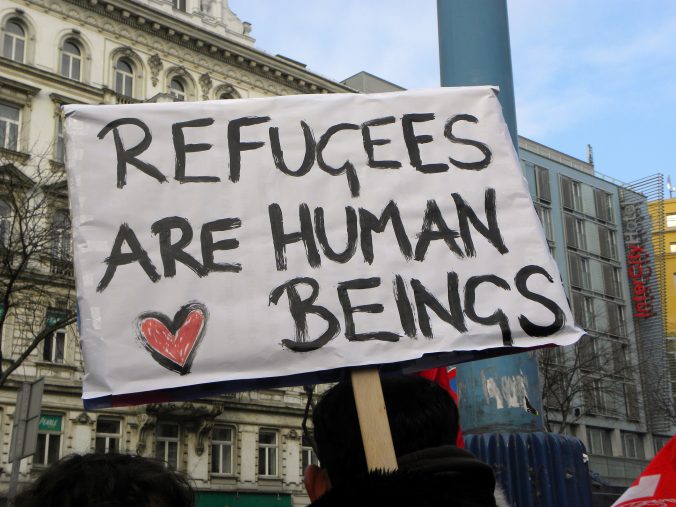The following sermon was preached at the University Chapel at Glasgow University for the Feast of Sts. Perpetua and Felicity. The gospel text was John 4:1-26 (Jesus and the Samaritan Woman.)
—————–
Imagine the scene: Crowds of spectators flooding the stadium to watch the brutal torture and murder of people guilty only of faith in “the wrong God.” Wild beasts and soldiers bearing arms are set to task, tearing the martyrs apart in front of the glee-filled assembly. Sounds terrifying, but not unbelievable – which I think is the scariest part of the whole scene.
Today we memorialize the martyrdom of Felicity and Perpetua – two women imprisoned in northern Africa in 203CE and put to death along with 3 male companions after their baptisms in the prison. As the lore goes, Perpetua was a widowed young mother and noblewoman who was in her catechumenate (time of study before being baptised into the faith) when she was arrested. Felicity, a pregnant servant, was arrested alongside Perpetua and is said to have given birth in prison before the sentence of death was carried out. Perpetua’s father tried to intervene several times, but each time Perpetua refused to deny her faith in order to be released.
We have record of their story by virtue of what is thought to be Perpetua’s diary. Perpetua spent her time in prison recording testimony of her faith and her visions of a miraculous life to come in Heaven.
This testimony, or diary, reminds me of another such document that we have in more modern literature – the Diary of Anne Frank. Frank, who was imprisoned in a different way – in an effort to keep her and her family safe, dreamed of a better life when she might once again be free to experience all that the world had to offer.
And further, as I think about the plight of these women: Perpetua and Anne, my mind is brought to Pakistan, and the then 15 year old girl, shot in the face by a Taliban soldier who was sent to kill her for speaking out as an activist for equal access to education for women and girls. Malala Yusafazai, now 19, lives in Birmingham and continues to fight for equal access to education. From there my thoughts travel to Syria and to Bana Alabed, the 7 year old girl who took to twitter to tell the world, 140 characters at a time, about the atrocities happening in Aleppo.
The list goes on and on and on. Throughout history, women like Perpetua have fought to get their stories out even in the face of unspeakable odds.
In our lesson from John’s Gospel we hear of one such woman, whose experience is recorded by our Gospel writer. Though her name is not preserved, as was so often the case with stories of woman in the scriptures, her encounter with the Living God in the person of Jesus Christ, illuminates for us the life changing power of meeting God face to face.
The Samaritan Woman learns from Jesus about a new type of water – of living water – that quenches the deepest thirst of our souls. She desires this water and Jesus tells her how to obtain that well of eternal life. Jesus demonstrates that he knows this woman in all ways, both her sins and her virtues, yet instead of condemning her, he tells her how she might be atoned. He offers her a path to a better life instead of condemning her to death by beasts or gas chambers or Taliban fighters or cluster bombs. Jesus reaches out his hand in love and offers the Samaritan woman another way.
What would happen if more people responded to difference the way Jesus does in this story?
The fact that this woman is a Samaritan matters. Many of us likely remember the story of the “Good Samaritan.” A man is beaten and robbed and left for dead by the roadside. A priest and then a Levite (both presumably good, Jewish men) pass by the man, crossing the road to avoid an encounter. But then a Samaritan comes by, stops, and takes the beaten man away to safety.
The Samaritans practiced a form of Judaism that was outside of the mainstream and was considered unorthodox and blasphemous. Thus, the Samaritans were often thought of, in biblical times, as a crowd worshiping the wrong way and thus not people you wanted to fall into company with.
So, who are the Samaritans today?
I guess it depends on where we are looking: In the US the Samaritans would probably be the illegal immigrants who are being rounded up and deported without due process or they might be the Muslims who are being denied entry to the US simply because of the God they worship. In Britain, the Samaritans might be those who voted for, or against, Brexit – depending on what side of the political arena one finds ones self. They might be the immigrants wondering how long they will be welcome here after we leave the European Union. In Glasgow the Samaritans might be the Protestants, or the Catholics, once again, depending on which side of sectarianism one finds oneself.
There are Samaritans everywhere we go – who they are is determined by where we live.
In many places, the Samaritans are the women who are striving to get their stories out into a world where gender is still a major factor when considering what rights an individual is entitled to.
Today we commemorate Perpetua and Felicity for their strength and courage in the face of a world that not only sentenced them to death, but also a world where it is a miracle that any account of their lives still exists.
We relate to their story because women are still fighting to be heard today.
Whether it is women who were condemned for having too many husbands in biblical times (when the reverse would have been perfectly acceptable) or women who have the audacity to expect the right to be educated in modern middle eastern society, the rights of women and men are still different. But what we take from today’s lesson, is that in the eyes of God we are entitled to equality not only in this life, but in the life that is to come. The Living Water is equally available to all who seek its nourishment.
The Feast of Perpetua and Felicity is unique not only because we have an early record of the visions and dreams Perpetua experienced during her captivity and because of the recorded accounts of the peace and “ecstasy” she and her companions experienced as they were put to death, but also because the record of this occasion is the written account, authored by a woman, that survived against all odds in a place and at a time when the written accounts of woman were destroyed and cast off as heretical. Today we celebrate the lives and legacies of these two women – as they represent the every-woman.
Our call today is to look out and see where we find Samaritans in this world and to seek to give them voice. Our call today is the same as it has always been, to be the hands and heart and voice of Christ in this world and to proclaim the existence of a God of love who desires to uplift and hold close the hearts of all human beings – regardless of the markers that divide us – because we were all created in God’s own image. Our call today is to follow in the bold and brave footsteps of Perpetua and Felicity; to tell the truth, come what may, all the while seeking justice, loving mercy, and walking humbly with our God.


Recent Comments